"Joy to the World" is an English Christmas carol. It was written in 1719 by the English minister and hymnwriter Isaac Watts, and its lyrics are a Christian reinterpretation of Psalm 98 and Genesis 3. The carol is usually sung to an 1848 arrangement by the American composer Lowell Mason.
"Ding Dong Merrily on High" is a Christmas carol. The tune first appeared as a secular dance tune known under the title "Branle de l'Official" in Orchésographie, a dance book written by the French cleric, composer and writer Thoinot Arbeau, pen name of Jehan Tabourot (1519–1593). The words are by the English composer George Ratcliffe Woodward (1848–1934), and the carol was first published in 1924 in his The Cambridge Carol-Book: Being Fifty-two Songs for Christmas, Easter, And Other Seasons. Woodward took an interest in church bell ringing, which no doubt aided him in writing it. Woodward was the author of several carol books, including Songs of Syon and The Cowley Carol Book. The macaronic style is characteristic of Woodward's delight in archaic poetry. Charles Wood harmonised the tune when it was published with Woodward's text in The Cambridge Carol Book. More recently, Sir David Willcocks made an arrangement for the second book of Carols for Choirs.
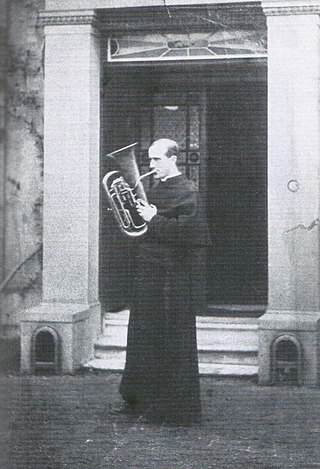
George Ratcliffe Woodward was an English Anglican priest who wrote mostly religious verse, both original and translated from ancient authors. The best-known of these were written to fit traditional melodies, mainly of the Renaissance. He sometimes harmonised these melodies himself, but usually left this to his frequent collaborator, composer Charles Wood.
The Reverend Fred Pratt Green was a British Methodist minister and hymnodist.

Psalm 98 is the 98th psalm of the Book of Psalms, beginning in English in the King James Version: "O sing unto the Lord a new song; for he hath done marvellous things". The Book of Psalms starts the third section of the Hebrew Bible, and, as such, is a book of the Christian Old Testament. In the slightly different numbering system in the Greek Septuagint version of the Bible, and in the Latin Vulgate, this psalm is Psalm 97. In Latin, it is known as "Cantate Domino". The psalm is a hymn psalm, one of the Royal Psalms, praising God as the King of His people. Like Psalms 33 and 96, it calls for the singing of "a new song".
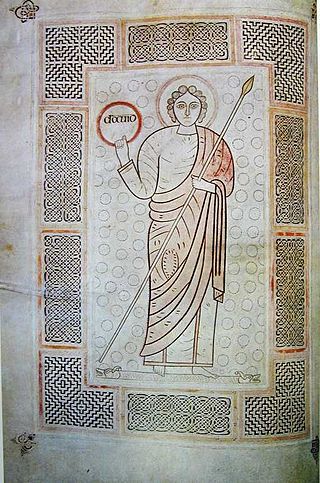
Psalm 100 is the 100th psalm in the Book of Psalms in the Tanakh. In English, it is translated as "Make a joyful noise unto the Lord, all ye lands" in the King James Version (KJV), and as "O be joyful in the Lord, all ye lands" in the Book of Common Prayer (BCP). Its Hebrew name is מִזְמוֹר לְתוֹדָה, 'Mizmor l'Todah' and it is subtitled a "Psalm of gratitude confession". In the slightly different numbering system in the Greek Septuagint version of the Bible, and in the Latin Vulgate, this psalm is Psalm 99. In the Vulgate, it begins Jubilate Deo, or Jubilate, which also became the title of the BCP version.
Sir Philip Stevens Ledger, CBE, FRSE was an English classical musician, choirmaster and academic, best remembered as Director of the Choir of King's College, Cambridge in 1974–1982 and of the Royal Scottish Academy of Music and Drama from 1982 until he retired in 2001. He also composed choral music and played the organ, piano and harpsichord.
Jürgen Henkys was a German Protestant minister and theologian.

O filii et filiae is a Christian hymn celebrating Easter. It is attributed to Jean Tisserand, a Franciscan friar.

Psalm 136 is the 136th psalm of the Book of Psalms, beginning in English in the King James Version: "O give thanks unto the LORD; for he is good: for his mercy endureth for ever. ". The Book of Psalms is part of the third section of the Hebrew Bible, and a book of the Christian Old Testament. In the slightly different numbering system used in the Greek Septuagint and Latin Vulgate translations of the Bible, this psalm is Psalm 135. In Latin, it is known by the incipit, "Confitemini Domino quoniam bonus". It is sometimes referred to as "The Great Hallel". The Jerusalem Bible calls it a "Litany of Thanksgiving". It is notable for the refrain which forms the second half of each verse, translated as "For His mercy endures forever" in the New King James Version, or "for his steadfast love endures for ever" in the Revised Standard Version.

Psalm 135 is the 135th psalm from the Book of Psalms, a part of the Hebrew Bible and the Christian Old Testament, beginning in English in the King James Version: "Praise ye the LORD". In the slightly different numbering system of the Greek Septuagint and Latin Vulgate versions of the Bible, this psalm is Psalm 134. Its Latin title is "Laudate nomen Domini".

Psalm 111 is the 111th psalm of the Book of Psalms, beginning in English in the King James Version: "Praise ye the LORD. I will praise the LORD with my whole heart". In the slightly different numbering system used in the Greek Septuagint and Latin Vulgate translations of the Bible, this psalm is Psalm 110. In Latin, it is known as Confitebor tibi Domine. It is a psalm "in praise of the divine attributes". This psalm, along with Psalm 112, is acrostic by phrase, that is, each 7-9 syllable phrase begins with a letter of the Hebrew alphabet in order. Psalm 119 is also acrostic, with each eight-verse strophe commencing with a letter of the Hebrew alphabet in order. The Jerusalem Bible describes Psalm 112, "in praise of the virtuous", as "akin to this psalm in doctrine, style and poetic structure.
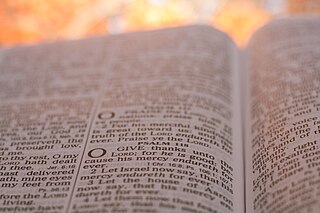
Psalm 118 is the 118th psalm of the Book of Psalms, beginning in the English of the King James Version: "O give thanks unto the LORD; for he is good: because his mercy endureth for ever." The Book of Psalms is part of the third section of the Hebrew Bible, and a book of the Christian Old Testament. In the slightly different numbering system used in the Greek Septuagint and Latin Vulgate translations of the Bible, this psalm is Psalm 117. In Latin, it is known as "Confitemini Domino quoniam bonus quoniam in saeculum misericordia eius". Its themes are thanksgiving to God and reliance on God rather than on human strength.
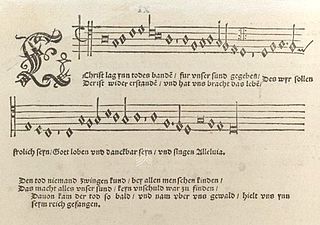
"Christ lag in Todesbanden" is an Easter hymn by Martin Luther. Its melody is by Luther and Johann Walter. Both the text and the melody were based on earlier examples. It was published in 1524 in the Erfurt Enchiridion and in Walter's choral hymnal Eyn geystlich Gesangk Buchleyn. Various composers, including Pachelbel, Bach and Telemann, have used the hymn in their compositions.

"Allein Gott in der Höh sei Ehr" is an early Lutheran hymn, with text and melody attributed to Nikolaus Decius. With the reformers intending church service in German, it was intended as a German version of the Gloria part of the Latin mass, used in almost every service. Decius wrote three stanzas, probably in 1523, while a fourth was added, probably by Joachim Slüter.
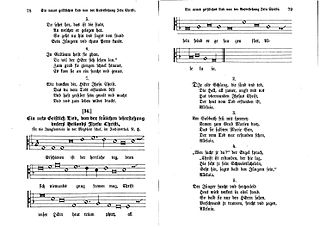
"Erschienen ist der herrlich Tag" is a German Easter hymn, with text and tune written by Nikolaus Herman and published in 1561. It has inspired musical settings by composers from the 17th to the 20th century. It appears in several hymnals, including the German Protestant hymnal Evangelisches Gesangbuch. Other hymns, especially Easter hymns, in both German and English, are sung to the same melody.
"Ermuntre dich, mein schwacher Geist" is a German Christmas carol with lyrics by Johann Rist and a melody by Johann Schop, first published in 1641. Historically it was contained in Protestant hymnals, but the current one, Evangelisches Gesangbuch, uses only three of its stanzas, the ninth, the second and the twelfth, titled "Brich an, du schönes Morgenlicht". This stanza was used by Johann Sebastian Bach as a chorale in Part II of his 1734 Christmas Oratorio.
"For the beauty of the earth" is a sacred choral composition by John Rutter, a setting of the hymn of the same name by Folliott S. Pierpoint. The work was published by Oxford University Press in 1980. Recorded several times, it has been described as "one of Rutter's more popular, enduring anthems".
"Ye Choirs of New Jerusalem" or "Sing, Choirs of New Jerusalem" is an English Easter hymn by Robert Campbell. It is a 19th-century translation of the medieval Chorus novae Ierusalem, attributed to Fulbert of Chartres. The text's primary focus is the Resurrection of Jesus, taking the theme of Jesus as triumphant victor over death and deliverer of the prisoners from Hell.
"Christians, awake, salute the happy morn" is an English Christmas hymn on a text by John Byrom. It is usually sung to the tune "Yorkshire" by John Wainright.












